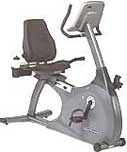Doctors, Hospital Find Success Fighting ObesityBrookhaven, MS -- A group of rural Mississippi doctors and hospital leaders at a Brookhaven Mississippi hospital have funded research to fight obesity in the fattest state in the nation. And they have seen remarkable success. How successful? If you consider success a 27 percent drop in body fat in eight weeks without dieting, the program is successful. If you consider that the research subjects (hospital employees, average age 46) only spent 20-minutes, three-days-a-week with a special exercise protocol created by one of the hospital employees, their obesity-fighting program is as successful as you can get. "The only way to get better results in body-fat loss is surgery," says Dr. Jeff Ross, hospitalist and a member of the hospital administrative staff. "This program could potentially save Medicare millions by reducing obesity and reducing the need for cholesterol-lowering statin drugs (a $14 billion dollar class of drugs) and reducing the number of diabetics and metabolic syndrome patients on Medicare," says Ross. The 20-minute, three-days-a-week exercise protocol is described as "scientific play," by Cheri Walker, Chief Nursing Officer for King's Daughters Medical Center, and a test subject for the one of the hospital's self-funded, obesity research projects. "This realistic exercise protocol has the potential to drastically reduce childhood obesity in the US," says pediatric cardiologist Dr. David Braden, lead author of the research report. "I don't want to see Mississippi ranked the number one most obese state in the US next year," says Braden. Obesity is shown to be the underlying factor for diabetes, hypertension, coronary heart disease, metabolic syndrome, arthritis, gall bladder disease, impaired fertility, complications during pregnancy, sleep apnea, gout, low-back pain, and one study shows that 20 percent of cancer is caused by obesity. Alvin Hoover, King's Daughters Medical Center CEO who holds two advanced degrees; one in healthcare administration and a second masters in exercise science says, "It's the hospital's responsibility to provide more than the best healthcare possible for those in our service area. We're called to go beyond that standard," says Hoover. "Our board, our physicians, and our staff have drawn a circle around our service area and we have implemented a health status improvement strategy to help those we serve to defeat obesity." The exercise protocol was developed years ago by a King's Daughters manager, Phil Campbell, who is board certified by the American College of Sports Medicine and the American College of Healthcare Executives. The exercise protocol is called the "Sprint 8" and it was designed by Campbell to target a natural release of exercise-induced growth hormone that is shown to get the same results as actually injecting growth hormone. Growth hormone injections are reported to cost as much as $1,000 per month in anti-aging centers, and it's banned for athletes because it illegally improves performance. Campbell explains that the natural way to increase growth hormone with exercise gets even better results. Growth hormone injections are shown to get desirable results. "When growth hormone is injected, the results are, on average, a 14.4 percent drop in body fat and an 8.8 percent gain lean muscle mass," says Campbell. "Our study on middle-aged working adults shows that targeting growth hormone with Sprint 8 gets twice the results of injecting growth hormone in body fat loss." Another important benefit women find attractive is research showing that growth hormone thickens skin by 7.1 percent. "The skin-thickening benefit means that wrinkles are filled in and this gives a more youthful appearance that women find motivating," says Campbell. The middle-aged research subjects in the King's Daughters study were required to participate in a one-hour presentation before beginning the eight-week Sprint 8 study. During the presentation Campbell explains that they may get comments about changing their makeup. "The skin-thickening potential is very motivating to women and a very real benefit," says Campbell. While Sprint 8 only takes 20 minutes, three-days-a-week, it is an intense exercise program that conditions the aerobic and the anaerobic processes for the heart muscle and he recommends that individuals get a physician exam before starting anaerobic exercise. "Sprint 8 can be performed in many different ways," explains Campbell, "one of the best ways to learn Sprint 8 is on your favorite piece of cardio equipment." Performing Sprint 8 on cardio equipment found in most fitness centers and at home is relativity simple. After a three minute easy-paced warm up, there are eight segments consisting of what Campbell describes, "30-second, all-out, fast-fiber recruiting, anaerobic cardio sprint." Each of the eight cardio sprints is followed by a 90-second "active recovery," which according to Campbell is equal to the intensity of walking. According to college science instructor Duane Burt, who is a part-time researcher at King's Daughters, the eight 30-second cardio sprints equal to only four minutes of high-intensity anaerobic activity and 16-minutes of an easy-pace active recovery. "This is a time-saving exercise protocol, and the results have been amazing. In a week's time," says Burt "Sprint 8 totals only one hour of exercise of which only 12 minutes is anaerobic. Everyone can find one hour a week for results like we are seeing." Research test subjects are told to start with two cardio sprints, and slowly build up to all eight. "If you ever think you can do more than eight, you didn't do it right," explains Campbell. The revolutionary Sprint 8 strategy has been studied and works. But there is only so much the rural hospital can do for now. Hoover and hospital leaders plan to seek a grant to expand the research and implement Sprint 8 in Brookhaven schools. The results Sprint 8 is getting for those that make an eight-week commitment to do the program is spreading like wildfire. Hospital employee, Elizabeth Smith heard about the trial study, and decided to give Sprint 8 a try. Her results: "Before starting Sprint 8, I was at the absolute unhealthiest stage of my life. At 260 pounds, 44 percent body fat," says Smith, "I couldn't walk up a flight of stairs without getting winded. I had to make a change and decided to give Sprint 8 a try." Smith wondered if she could really see the touted results in 20 minutes, three-days-a-week. "Sprint 8 has totally changed my life…actually I believe it saved me. Six months after starting Sprint 8, I've lost 60 pounds and dropped to 26% body fat. I have more energy now than I have ever had. Everyone tells me how great I look now. The workout is not easy, but the process is as easy as 20 minutes-a-day, three-days-a-week. People ask me every day if I did all this with diet and exercise and I get to tell them, 'no diet…just exercise'." Jennifer Jones, a King's Daughters registered nurse, experienced the eight-week trial study and saw similar results. "I just wanted to feel better and look better, but I didn't realize the impact that Sprint 8 would have on my cholesterol. My physician had told me that I was going to have to get on cholesterol medicine. My mom and dad both have high cholesterol. But I refused because of the side effects and just hoped it would come down on its own," explains Jones. When Jones began the program, her body fat was 31 percent. After 8 weeks, her body fat dropped to 18 percent without dieting. Although Jones' weight remained about the same due to the building of muscle, her total cholesterol dropped from 270 to 183. "I have been very pleased with the results and will continue doing Sprint 8. I have so much more energy," says Jones. Chairperson of the King's Daughters Medical Center board, Melinda McBride also felt the energy increase when she started the Sprint 8 protocol. "I have double the energy and that keeps me going as the hospital board chair and as a grandmother who plans on being active with my grandchildren for years to come," says McBride. Campbell explains that Sprint 8 changes the body at the cellular level to improve energy. He cites studies showing that the number of mitochondria, the part of muscle cells that turn food and oxygen into energy are doubled in eight weeks. "Sprint 8 can double energy capacity in a few short weeks," says Campbell. "Sprint 8 is like interviewing the body and asking 'what kind of exercise program should I be doing,' explains Campbell, "and the body is screaming at us through new research that when we do Sprint 8, the body releases the most powerful body fat reducing, energy generating, muscle toning substance known in science -- exercise-induced growth hormone." See Full KDMC Obesity study here More Sprint 8 Cardio Info here
|
|
Featured
in
|
|
|
|






